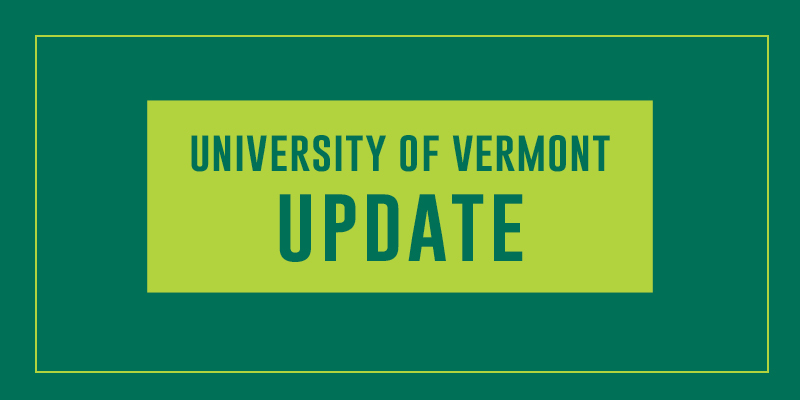Dear UVM Community Members, As we continue to adjust to the many challenges being posed by the coronavirus outbreak (COVID-19), I want to take a moment to acknowledge your incredible work, dedication and “can-do” spirit. I see it, I am deeply appreciative of it, and I could not be more proud to be a member of this remarkable community.
Firstly, to our students, I realize this is a time of great disappointment and uncertainty. As the father of two college students, I know that you want to be with your friends and share in the camaraderie that comes with in-person classes, and shared living and dining. And I know that many of you do not feel personally at risk for COVID-19. That’s why your response to this situation deserves special recognition.
By working with us to contain the spread of the virus, you are protecting more vulnerable members of our community. Some of these individuals may be your family members, others may be faculty or staff you’ve grown close to, and others may be fellow students who, despite their ages, may be at greater risk to the effects of the disease due to underlying conditions. The difficult actions you are taking now are emblematic of our respectful and caring community. And they demonstrate the strength of our society and our nation.
Rest assured that, although the delivery mechanisms may be different, you will still receive the instruction, guidance, and mentorship that make a UVM education so special. Services, such as tutoring, advising, and career counseling, remain available to all students no matter where you are—watch for more detailed information coming soon from Student Affairs. And, as I’ve shared previously, know that your continued success is my priority.
To our wonderful staff members, I know the evolving nature of this situation poses enormous pressure on you. Often, you are the forward face of our university, answering the calls, emails, and other inquiries from concerned community members. I greatly appreciate your efforts to reassure others by providing accurate and up-to-date information, while you develop and adapt to new frameworks to support our students and faculty. You help keep our campus operational, our critical research programs ongoing, and share warmth and care in every one of your interactions, as I have personally witnessed. Without you, we truly could not deliver for UVM.
And to my fellow faculty members, I thank you for the excellent work you’re doing to maintain the high-level educational experience for which we’re known. I’ve heard about the Facebook brainstorming sessions, and exchange of information across schools, colleges, and disciplines, all aimed toward advancing the education of our students. The need to switch to remote instruction has required a fast-pivot, and you’ve done that with exceptional grace. Ever the optimist, I would not be surprised to see many pedagogical positives come out of this challenge.
Finally, I want to emphasize my sincere gratitude to our entire community. It’s ironic that at a time when it’s best to keep our physical distance, we need to come together in spirit and focus. We are doing that, and we are doing that extremely well.
Thank you and take good care.
Suresh V. Garimella
President
Source: UVM News

